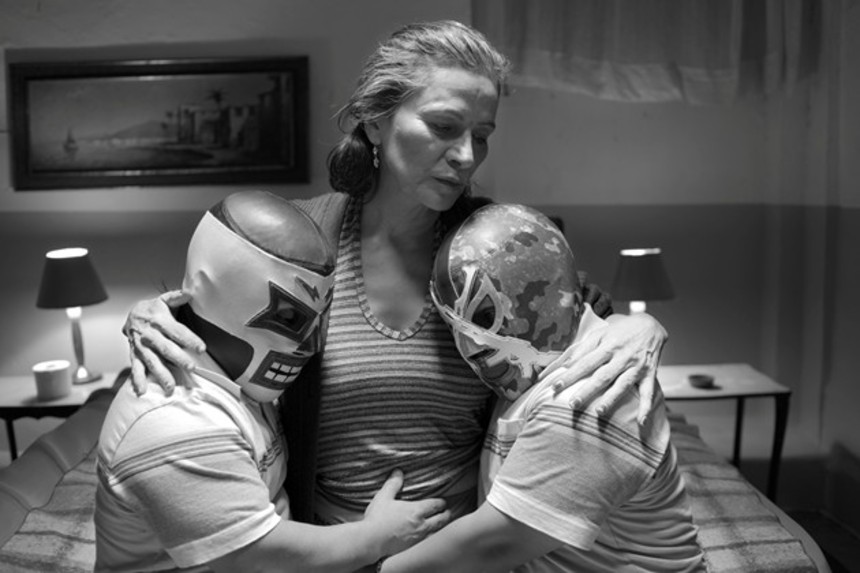Review: BLEAK STREET, True Crime Turned Into A Visually Striking Dark Carnival

Bleak Street, the very appropriately named new film from veteran Mexican director Arturo Ripstein, is ripped from the headlines, much like the TV show "Law and Order." Inspired by the double murder of two dwarf men who were popular luchadores (masked wrestlers), Bleak Street paints a vivid picture of the desperate characters who play out their quietly hellish existences in the titular location. Filmed in stark monochrome, it evokes both Fellini and Bunuel in both its intimations of a dark carnival and its biting social commentary, touched with a pronounced sense of the absurd.
The lucha libre performers of this story are Little Death (Juan Francisco Longoria) and Little AK (Guillermo Lopez), twin brothers who wrestle as miniature mascot versions of the normal-sized wrestlers Death and AK. So dedicated are Little Death and Little AK to their profession that they never take their masks off, not even in the presence of their wives and children. Even while eating or drinking, they only slightly lift the bottom of their masks to do this. Despite their admirable work ethic, they are underpaid, exploited and disrespected by their taller counterparts, who act as the brothers' bosses. Still, they continue plugging along, harboring ambitions of escaping their lot in life.
Plying a different kind of trade on this street are Adela (Patricia Reyes Spindola) and Dora (Nora Velazquez), two aging prostitutes who are falling on increasingly hard times as they are being pushed aside for younger and prettier women. ("Does experience count for nothing?" Adela asks. The answer from her madam is an emphatic "No.") Besides their difficult work lives, they must contend with equally fraught home existences. Adela has an invalid mother whom she wheels out daily to beg for money on the street, while Dora must support a bratty daughter and a husband who dresses in her clothes when he cheats on her with his male lovers.
The two pairs cross paths one night when, after a victorious match, Little Death and Little AK celebrate by hiring a couple of hookers for the night, who just happen to be Adela and Dora. To supplement their meager prostitution income, they've cooked up a scheme involving using prescription eye drops to spike their clients' drinks, knocking them out to rob them while they sleep. The wrestlers are meant to be the women's latest unlucky victims. Unfortunately, Adela and Dora fail to compensate for the brothers' diminutive sizes, and accidentally administer a fatal dose. When the women discover what they've done, they flee the scene to try to avoid capture by the police.
Bleak Street immerses us deeply into its vividly portrayed milieu of wrestlers, hustlers, and hookers, with prowling camerawork and unnervingly long takes that showcase the strikingly brilliant work of cinematographer Alejandro Canto. The high-contrast black-and-white photography paradoxically enhances to (metaphorically) colorful nature of the inhabitants of this "street of bitterness" (the film's original Spanish title). There's much melodrama and tragedy here, but it's rendered with a detached, rather merciless air that reinforces Ripstein's favored theme of characters impacted by the inexorable forces of fate and destiny. As a result, any sort of sympathy is very much muted, if not precluded altogether. This gives us a sense of distance from everything that can become somewhat alienating, yet Ripstein's unrelenting rigor and refusal to hold up his characters as objects of pity generates a strange sort of fascination that is often quite compelling.
Bleak Street opens in New York on January 20 at Film Forum.

Do you feel this content is inappropriate or infringes upon your rights? Click here to report it, or see our DMCA policy.






